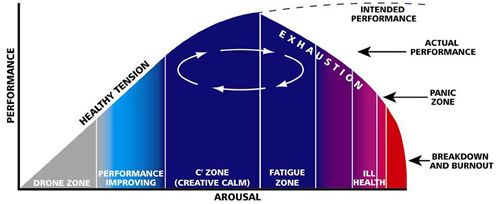When you understand that stress is the body’s reaction to any change, you will be better able to identify and anticipate stress. You cannot see stress, but you can see the effects of stress on the human body. Most people link headaches, stomach aches, angry responses, and forgetfulness to stress. However, the excitement of a new job, the surprise of an unexpected reward, the anticipation of a performance are examples of changes that feel good and still cause physical response. The events that trigger a stress response are calledstressors. With self-awareness, you can learn to spot and manage the stressors in your life.
The American Institute of Stress points to The Human Function Curve to illustrate the difference between positive stress (stress) and negative stress (distress). Reading the graph form left to right, you can see that as stress arousal increases, body performance increases.

Most performers would agree that a little anxiety sharpens the mind for recall and tightens muscles for quick movement. However, notice that as stress arousal continues to grow and performance levels increase, fatigue will eventually start to reduce performance. If stress arousal continues, performance will eventually break down completely. Some stress arousal is helpful, more is good, and too much is disastrous. The intensity of stress and duration of stress can turn an exciting change into a distressing experience.
What is stress?
- a difficult event
- the body’s response to unexpected events
- the body’s response to fatigue
- the body’s reaction to change
Stress is the body’s reaction to change.
Stress is the body’s reaction to change.
Stress is the body’s reaction to change.
Stress is the body’s reaction to change.
As stress arousal increases, what happens to body performance?
- it increases
- it doubles
- it slows
- it decreases
As stress increases, body performance decreases.
As stress increases, body performance decreases.
As stress increases, body performance decreases.
As stress increases, body performance decreases.
When stress becomes too great, what happens to performance?
- it improves
- it is reduced
- it speeds up
- it becomes scattered
If stress becomes too great, performance is reduced.
If stress becomes too great, performance is reduced.
If stress becomes too great, performance is reduced.
If stress becomes too great, performance is reduced.
Summary
 Questions answered correctly:
Questions answered correctly:
 Questions answered incorrectly:
Questions answered incorrectly:
